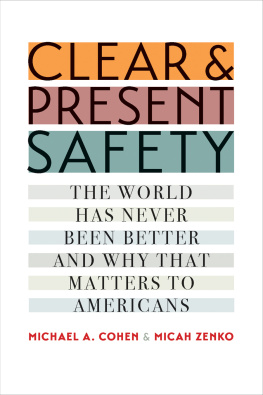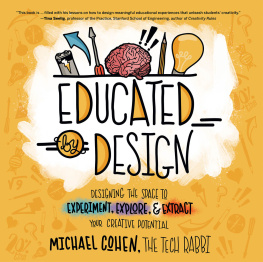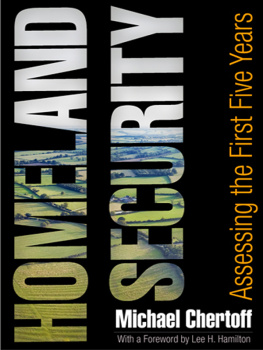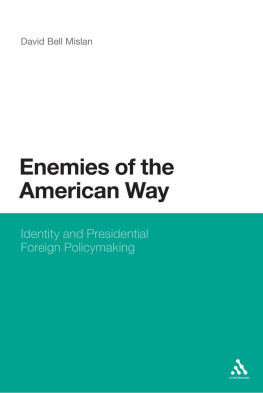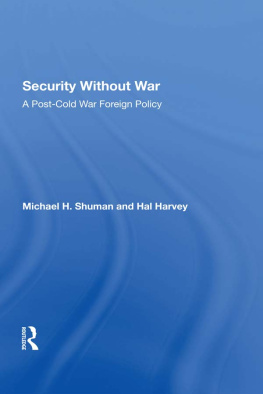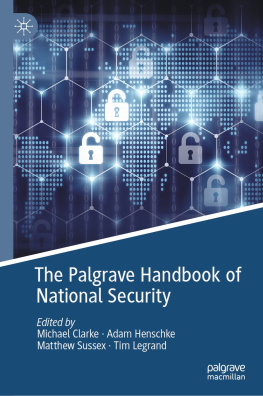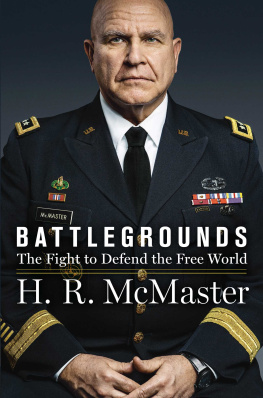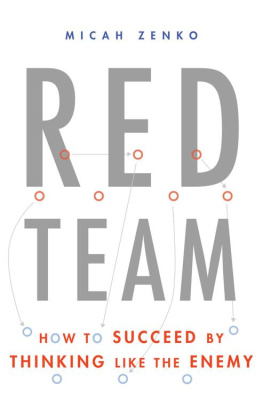Clear and Present Safety

Published with assistance from the Louis Stern Memorial Fund.
Copyright 2019 by Micah Zenko and Michael A. Cohen.
All rights reserved. This book may not be reproduced, in whole or in part, including illustrations, in any form (beyond that copying permitted by Sections 107 and 108 of the U.S. Copyright Law and except by reviewers for the public press), without written permission from the publishers.
Yale University Press books may be purchased in quantity for educational, business, or promotional use. For information, please e-mail (U.K. office).
Set in Gotham and Adobe Garamond type by IDS Infotech, Ltd.
Printed in the United States of America.
Library of Congress Control Number: 2018954947
ISBN 978-0-300-22255-5 (hardcover : alk. paper)
A catalogue record for this book is available from the British Library.
This paper meets the requirements of ANSI/NISO Z39.48-1992 (Permanence of Paper).
10 9 8 7 6 5 4 3 2 1
To Isadora and Scarlett
MC
To Michael and Denise
MZ
Contents
Acknowledgments
This project began in 2011, when Michael was writing a short piece on the twentieth anniversary of the end of the Soviet Union with the counterintuitive argument that the world is actually far safer now than it was then. He called Micah to talk about that thesis, and a friendship and book idea were born.
Over the next several years, we found ourselves repeatedly asking why the world was so overwhelmingly characterized by U.S. politicians, pundits, military officials, think tankers, and the media as one of perpetually greater dangers, darkness, and chaos. Correspondingly, we recognized that these same voices portrayed the United States as facing ever-graver and growing foreign threats, while ignoring the real threats and harms that Americans face every day. Our in-boxes are still filled with emails we have sent to each other over the years of can you believe he/she said that statements from threat-mongering politicians and pundits, tales of amazing and unreported global development progress, and chronicles of challenges yet unmet.
This book represents the culmination of our exploration into this subject, and like most books that cover multiple disciplines, it was only possible with the original analysis, guiding insights, and feedback from many scholars, analysts, and colleagues. These include Steven Pinker, John Mueller, Chris Preble, Christopher Fettweis, Rebecca Friedman Lissner, Sean Kay, Michael Hanna, Peter Krause, John Schuessler, Fredrik Logevall, John Glaser, Heather Hurlburt, Adam Zenko, Barry Posen, Paul Miler, Steve Walt, Elizabeth Economy, Adam Segal, Amelia Mae Wolf, and Courtney Lobel. We are also particularly thankful to Justin Vogt and Gideon Rose at Foreign Affairs, who agreed with us that an article examining why the world is actually safer than we have been led to believe would make for a provocative and important argument. They helped us turn that idea into the article that became the inspiration for this book.
A special thanks is also extended to Jenn Wilson of the Council on Foreign Relations (CFR) for contributing invaluable research, critical recommendations, and editing. We could not have completed this book without her assistance. Several CFR interns, including Dan Alles, Susanna Kalaris, Caroline OLeary, and Max Friedman, also provided research support throughout the writing process. Of course, all errors of fact or analysis are our own.
We also are grateful for the institutional backing that we received throughout the past seven years, including from Foreign Policy, CFR, and as the Whitehead Senior Fellow in Chatham Houses U.S. and the Americas Program for Micah. Over the years, Michael was able to preview some of the research for this book in his regular column for the Boston Globe, which his editor, Marjorie Pritchard, affectionately and jokingly called his good news pieces. Michael is indebted to the Globe and to Marjorie, in particular, for her steadfast support of his work over the past four years.
We also must thank our outstanding agent, Geri Thoma, for helping us find a publisher, and Jaya Aninda Chatterjee at Yale University Press and Andrew Katz for bringing the manuscript to print.
On a more personal note, as we put together the final edits for the aforementioned article in Foreign Affairs, Michaels daughter Isadora was born. In fact, in late December 2011, the two of us sat in a hospital room on New Yorks Upper East Side with Michael holding his new baby in one arm and the final edits of that article in the other. Michael now has two children, Izzy and her younger sister, Scarlett. He dedicates this book to themas a reminder of the extraordinarily hopeful world in which they will come of age but also the vigilance that they must maintain in order to ensure that it remains that way for them, for their children, and for their childrens children.
Micah dedicates the book to his parents, Michael and Denise, who have provided a lifetime of love and support, for which he will always be grateful.
Clear and Present Safety
Introduction
Neither a man nor a crowd nor a nation can be trusted to act humanely or to think sanely under the influence of a great fear.
Bertrand Russell
On a crisp January day in 2016, in the small hamlet of Pittsfield, New Hampshire, several hundred voters were gathered for what is a quadrennial rite of passage in the Granite State: listening to a politician make his or her pitch to be the next president of the United States. The speaker this day was Chris Christie, who was then the Republican governor of New Jersey and one of more than a dozen presidential candidates campaigning across the state.
Christie discussed everything from illicit drugs and immigration to the federal budget and the U.S. war against the self-proclaimed Islamic State. He was pretty good, one woman unenthusiastically shrugged after he finished. But as she struggled to say anything of substance, it seemed clear that Christie had not made much of an impression. When asked, though, if any specific policy issue took on particular importance, her face lit up: ISIS. Im really worried about ISIS. The thought of her kids and grandkids growing up in a world where groups like the Islamic State would be threatening their future seemed to cause her genuine and palpable concern.
It is not just armed jihadists that scare Americans. A 2012 poll showed that six out of seven Americans agree that the United States
How Americans, such as this woman from a small town in the Live Free or Die state, became convinced that the United States faces such acute and harmful foreign threats is, at its core, the story of this book. The American public is being fed, by politicians and pundits alike, a steady diet of threat inflation that has made them deeply fearful of the world outside their borders. They have become convinced that overseas menaces are perpetually becoming more likely, lethal, and complex. The world is forever on fire; America is always getting weaker; and its citizens are facing a constant drumbeat of tremendous and unceasing risks. The pervasiveness of threat inflation is such conventional wisdom that alternativeor even less threateningdescriptions of the world are largely nonexistent in foreign policy debates. As a result, most Americans are simply unaware of the extraordinary and unprecedented political, economic, and social progress that has taken place in virtually every corner of the globe over the past three decades.
On that January day in New Hampshire, while alluding to the national debate on the balance between security and privacy, Christie declared ominously, You cant protect civil liberties from a coffin. Pittsfield voters who had watched the most recently aired Republican presidential debate would have heard former Florida governor Jeb Bush tell them that the Islamic State had formed a caliphate the size of Indiana with ... 30,000 to 40,000 battle-tested soldiers that are organized to destroy our way of life.
Next page
